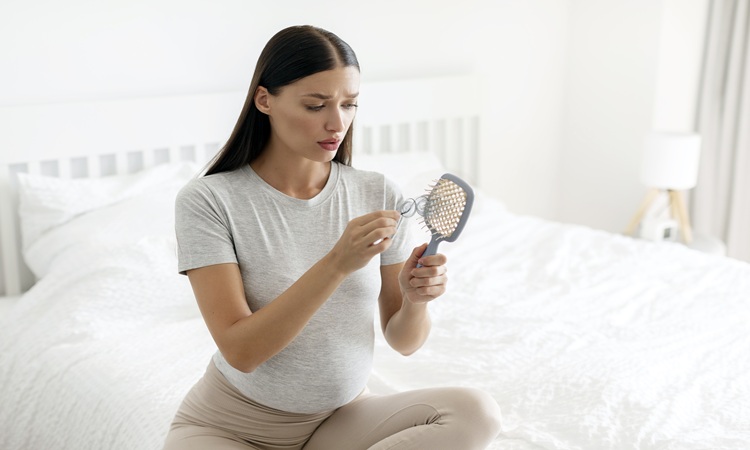Hair Loss During Pregnancy: Causes, Myths, and Effective Remedies
2025-11-17 / RG STONE HOSPITAL / Female Urology

Pregnancy is often celebrated as a phase of glowing skin, thick hair, and radiant health. While many women do experience fuller, shinier hair during these months, others may notice something unexpected—increased hair fall during pregnancy. This can feel alarming, especially when you’re already navigating so many physical and emotional changes. The good news is: hair loss during pregnancy is usually temporary and easily manageable with the right care.
This blog explains the real causes, debunks common myths, and provides effective, safe remedies recommended by experts at RG Hospitals.
Understanding Hair Loss During Pregnancy
Hair growth follows a cycle that includes phases of growth, rest, and shedding. During pregnancy, hormonal changes—especially fluctuations in estrogen and progesterone—can disrupt this cycle. While some women experience enhanced hair volume, others face excessive shedding or thinning.
If you're experiencing hair fall in pregnancy, it does not necessarily indicate a deficiency or a serious health issue. Most often, it’s a temporary response to internal changes.
Common Causes of Hair Loss During Pregnancy
1. Hormonal Imbalance
Pregnancy hormones can push more hair follicles into the resting (telogen) phase, leading to shedding. This condition is known as telogen effluvium. It may occur during pregnancy or a few months after delivery due to sudden hormonal shifts.
2. Nutritional Deficiencies
Your body requires additional nutrients during pregnancy. Low levels of iron, protein, Vitamin D, or Vitamin B12 may lead to hair thinning and breakage.
3. Stress and Fatigue
Emotional stress, physical tiredness, sleep disturbances, and pregnancy-related discomforts can all impact hair health.
4. Thyroid Disorders
Some pregnant women develop hypothyroidism or hyperthyroidism, which can cause noticeable hair fall. Screening and early diagnosis are important for both mother and baby.
5. Changes in Hair Care Routine
Switching to gentler shampoos, avoiding hair dyes, or reducing salon treatments (common during pregnancy) may affect the texture and appearance of hair, sometimes giving an impression of increased hair loss.
6. Genetic Factors
If hair thinning runs in your family, pregnancy may amplify this tendency temporarily.
Common Myths About Hair Loss in Pregnancy
Myth 1: Hair fall means something is wrong with the baby.
Fact: Hair loss is related to maternal hormonal and nutritional changes—it does not affect the baby.
Myth 2: Pregnant women should not wash their hair frequently.
Fact: Washing hair does not worsen hair fall. Clean scalp actually promotes healthier follicles.
Myth 3: Oiling increases hair growth instantly.
Fact: Oiling nourishes the scalp but does not change the growth rate of hair follicles.
Myth 4: Taking more supplements will reduce hair fall.
Fact: Supplements should never be increased without a doctor’s advice as they can harm the pregnancy.
Effective Remedies for Managing Hair Loss During Pregnancy
1. Maintain a Balanced, Nutrient-Rich Diet
Focus on foods rich in:
-
Iron: spinach, lentils, eggs
-
Protein: dal, paneer, chicken, nuts
-
Omega-3: walnuts, flaxseeds
-
Vitamins D & B12: dairy, fortified foods
Your body prioritizes the baby’s development, so nourishing yourself is essential.
2. Use Mild, Pregnancy-Safe Hair Care Products
Opt for:
-
Sulfate-free shampoos
-
Paraben-free conditioners
-
Gentle, herbal hair masks
Avoid harsh chemicals that can irritate the scalp.
3. Be Gentle With Your Hair
-
Avoid tight hairstyles
-
Use wide-tooth combs
-
Reduce heat styling
-
Dry hair naturally whenever possible
These habits minimize breakage.
4. Manage Stress Levels
Prenatal yoga, meditation, breathing exercises, and adequate sleep can significantly improve hair health—and overall well-being.
5. Consider Doctor-Guided Supplements
If deficiency is detected, your doctor may prescribe:
-
Iron supplements
-
Vitamin D
-
Folic acid
-
Prenatal vitamins
These are safe when taken under medical supervision.
6. Stay Hydrated
Adequate hydration supports blood circulation and scalp health, which helps reduce hair fall.
When Should You Consult a Doctor?
You should visit a specialist at RG Hospitals if:
-
Hair fall is sudden, severe, or patchy
-
You have fatigue, weight changes, or mood swings (possible thyroid imbalance)
-
You notice scalp redness, itching, or dandruff
-
Hair fall continues for more than 6 months
Timely diagnosis ensures safe and effective treatment, especially during pregnancy.
Takeaway
Hair loss during pregnancy can feel unsettling, but remember: it is common, temporary, and treatable. With the right care, balanced nutrition, and medical guidance, you can restore hair strength and confidence.
At RG Hospitals, our experts provide personalised care for pregnancy-related concerns, ensuring you stay healthy throughout your beautiful journey into motherhood.
If you’re experiencing persistent hair fall in pregnancy, our gynaecologists and dermatologists are here to help.
Categories
Hernia Repair
Appendicitis
Piles
Urological Treatment
Hernia treatment
Enlarged Prostate (BPH)
Gall Bladder Stone
Urinary / Kidney Stone
Vitamins
Indian Health Care System
Exercise
Obesity
Female Urinary Incontinence
Single Incision Laparoscopic Surgery (SILS)
Kidney Cancer
Bladder Cancer
Ovarian cancer
Nephrology
Bariatric Surgery
Kidney Function Test
Female Urology
Radiation Therapy
Alcoholic Fatty Liver
Liver disease
Gastroenterology
Kidney Disease
Nutrition & Health
Lung Cancer

